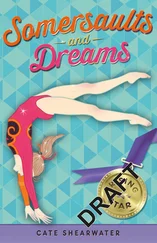She waited in line for the phone. In front of her, two unkempt English women stood: they had run out of money and were calling home. By the time her turn came, the others had reached the yacht. She spoke with the nanny. Everything was fine. She felt relieved, but there was an emptiness inside her. She was moved by the sight of a cat wandering along the quay, and she picked it up and held it in her arms. They were all so alien and indifferent to her on the yacht — except for the doctor. She wanted to have some fun. That night (she had seen a poster while she was waiting to use the phone), the fantastic disc jockey Francisco would be visiting the island, only for that weekend, at the Nafsik discotheque. There was going to be a dance competition.
“Shall we go?” she suggested to the others. “It’ll be good for a laugh.”
Opinions seemed to differ. Some wanted to go, others couldn’t be bothered. Undeniably, all of them together, as a group, were difficult to get going. There were too many of them, all unrelated to each other.
The doctor said nothing. He was playing
backgammon with the engineer and waiting for the moon to come out.
Elias had disappeared into his cabin with Madam
“tag along.” She had brought with her an American woman, who liked Greece so much she declared she was staying permanently. Out of boredom, once the game was over (he had lost again), the doctor thought of striking up a conversation with her. He had noticed that nobody was talking to her, and he felt a little sorry for her. Besides, it would be a good opportunity for him to polish up his English.
Night had fallen for good. The American woman had to have it, and the doctor, closing his cabin door, offered her a pound of testicles. She saw them, evaluated them, and wanted to try them. They seemed to her like quite a bunch. Muscat. The doctor locked the door, drew the porthole curtains, and watched her undress. Below her worn, inexpensive clothes, her body began to reveal its curves and swells. She had nice legs, though a little on the heavy side, a slim waist, narrow hips, and a wonderful chocolate-colored chest. He didn’t care much for her face. Her eyes were like two holes.
She looked him over. He was quite strong, with a little fat around the waist, but she liked the bulk of his cocoon of caterpillars. They lay down on the narrow bunk.
She told him immediately that it had only been two days since she had last made love. She wasn’t desperate was what that meant. He told her that he had screwed Aphrodite that morning (he indicated which one of the women she was) and that he still had her smell on him. That didn’t seem to bother the American. When in Greece, she would screw as often as possible. And it was possible very often. She used a diaphragm, so he could ejaculate inside her, not to worry.
The doctor lay down next to her and touched her nipple. Right away, she put her hands between his legs and held his eggs as if weighing them. They were much more than two handfuls, and that pleased her.
Then she spread her legs and told him that she was ready and wet for him to come inside her if he wanted.
He entered her, and his arms filled with raw meat.
A piece of meat wanting another piece of meat in a meaty contact.
“Your friend is still doing it,” he whispered to her.
“Yes,” she replied, “that’s why she came on the cruise.”
She confessed to him that she could not live without the joy of lovemaking. She had been deprived of it when she was younger; in the States it had become a complicated affair. If it wasn’t herpes it was AIDS; people had become terrified. They had become asexual. Whereas in Greece nobody cared about diseases. Like bacchic Gods, they all got drunk on its drunkenness.
Little by little she started tasting his wine. She inhaled it wholeheartedly, spasmodically, making a gift of her inner pulsations, which for her were a routine matter.
As long as he couldn’t see her face, the doctor imagined he was making love to Fiberglass, Plasterboard’s wife, a brunette, Raquel Welch-type temptress. Meanwhile the American had started to pant. She was climbing up the hill. At last she reached the top, and, seeing the hillside covered in flowers down below, she let herself roll down, as happy as a meatball, crying out and declaring her joy. The flowers were crushed as she steamrolled over them. When she reached the bottom of the ravine, she bent down to drink from the stream. She had him in her mouth and she was sucking him.
The doctor suggested she turn around. Not to penetrate her anally but to enter her from behind. She accepted. And she climaxed for a second time, soaking the sheets.
The ship was at sea again by the time they came up on deck. The others were already having dinner.
Their plates were waiting for them. A full moon poured its silver light onto the sea. Hungry after their lovemaking, they sat down to dinner.
Persephone had heard the sighs of the American when she had gone downstairs to the rest room, and she had timed their session: it had lasted three quarters of an hour. That evening, she would have the doctor, and she already felt a certain thrill inside her. But why did these foreign leeches latch onto the domestic market like that?
At the table, even though politics was a forbidden subject, Aristotle, who had studied sociology in Paris, had tried to answer Persephone’s question for her.
From the time the Greek state was founded, he said, foreign powers had played a decisive role. The indigenous Greeks were nothing but extras in a play where the leading roles were held by the three great powers: the English, the Russians, and the French, whose equivalent nowadays would be the United States, the Europeans, and the Soviets. At that moment, Plasterboard was heard complaining about the reluctance of the Socialist government to embrace somewhat more steadily the private sector. Aristotle, who had just been waiting for an excuse to show off his knowledge, quickly dropped Persephone in order to take up the industrialist’s challenge. It was necessary, unfortunately, and there were no two ways about it, if one were to understand the present, to go back a little in history. Recent history, not ancient or Byzantine. In Greece, after its liberation from Ottoman rule, there was no accumulation of capital, so to speak. The War of Independence took place for ideological and economic reasons, but when in 1854, the sultan conceded to the Greeks of the diaspora the same rights as Ottoman subjects enjoyed, there was no reason anymore for Greeks living abroad to turn toward an independent nation-state that would not have guaranteed them anything more than the Turks had already, very cleverly, given them. Thus, after having helped in the War of Independence, the Greeks abroad, taking the bait of equality that the sultan had thrown them, remained in a state of diaspora. Which is why, after 1854, the Greeks who were thriving in other countries showed no more interest in Greece. Because as we know, concluded Aristotle, capital has no homeland.
The others listened to him with a certain amount of boredom, until Arion picked up his guitar. What could be better on a moonlit evening?
The islands, like tortoise shells, were sleeping blissfully, islands that had once played an historic role in the War of 1821 and that nowadays were pockets of tourism, beehives of foreigners, collecting the pollen of foreign currency to make honey and wax for the winter. These islands slipped by like a vision of huge sea turtles. Soon, the ghosts of pirates and mermaids would appear.
“I don’t feel very well,” Pavlos said.
“Something’s upset my stomach.” He went to the restroom and threw up. After that, he felt better.
“The yacht is transferring its waste,” observed Nikos, leaning over the ship’s rail and watching Pavlos’s vomit being emptied into the sea.
Читать дальше












